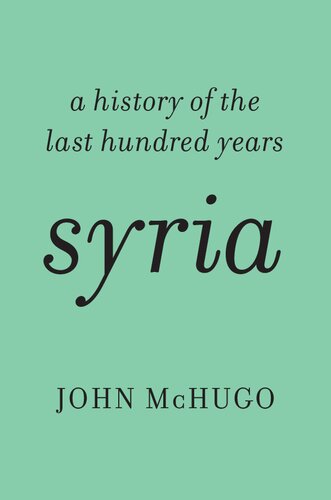
Syria
A History of the Last Hundred Years
کتاب های مرتبط
- اطلاعات
- نقد و بررسی
- دیدگاه کاربران
نقد و بررسی

January 26, 2015
Syria, lacking natural defenses and located at the crossroads of three continents, has always been susceptible to foreign interference. McHugo (A Concise History of the Arabs), an international lawyer and Arabist, untangles the fraying threads of Syria’s fragile polity and tracks the global fault lines that make the current civil war arguably “the last proxy conflict of the Cold War.” Proceeding briskly from the fall of the Ottoman Empire to the present-day chaos, he sketches how Syria’s first, hopeful experiments with democracy inexorably gave way to military dominance and autocracy: “The ideologically based parties took part in democratic politics, but they also recruited army officers who... ultimately came out on top.” McHugo capitalizes on recent interest in the region, warning that “if the Syrian civil war cannot be ended, it seems only a matter of time before it engulfs the rest of greater Syria,” but his attempts to draw connections between ISIS, French colonial efforts to foment sectarian tension, and the Israeli-Palestinian conflict are rudimentary and insufficient. Useful as a concise overview of independent Syria’s most important movements and personalities, McHugo’s book gives readers the basic background necessary to understand the country, but it will leave those who seek greater comprehension of the current conflict wanting more. Illus.

January 15, 2015
Sober-minded history of a nation that has existed in its present form for less than a century, one "predestined to descend into chaos and civil war."What is Syria? Like so many political entities in the Middle East, it is the product of lines on colonial maps drawn according to the tenets of division and conquest. However, warns London-based Arabist and attorney McHugo (A Concise History of the Arabs, 2013), it would be a mistake to think that simply redrawing the map could redress that country's terrible problems, one of them being the fact that some 40 percent of the population has been displaced to some degree or another in the last three years of civil war. Repartitioning the country, he warns, carries numerous drawbacks: "This is an outbreak of the old Western disease of drawing pretty lines on maps and then expecting the peoples of Greater Syria to step neatly into the zones marked with the particular color chosen for them." Those colors are widely varied, for Syria contains numerous kinds of people: Christians and Muslims in various strains, Jews and Zoroastrians, Kurds and Palestinians, and many more. McHugo charts the slowly building tragedy that has set these peoples far apart, beginning when the country's first ruler "recognized no distinctions between the three monotheistic religions, and that all were equal and entitled to the same rights and subject to the same duties." Sadly, that ecumenical view disappeared with the rise of Ba'ath party nationalism, which blended elements of Arab revanchism and Western socialism in an uneasy alliance that would yield the likes of Saddam Hussein in Iraq and Bashar al-Assad in Syria, both of which played proxy roles in the Cold War between the United States and the Soviet Union and continue to play roles in the struggle between the West and Russia today. Scholarly but accessible and of much interest to those with an eye on geopolitical matters.
COPYRIGHT(2015) Kirkus Reviews, ALL RIGHTS RESERVED.

























دیدگاه کاربران